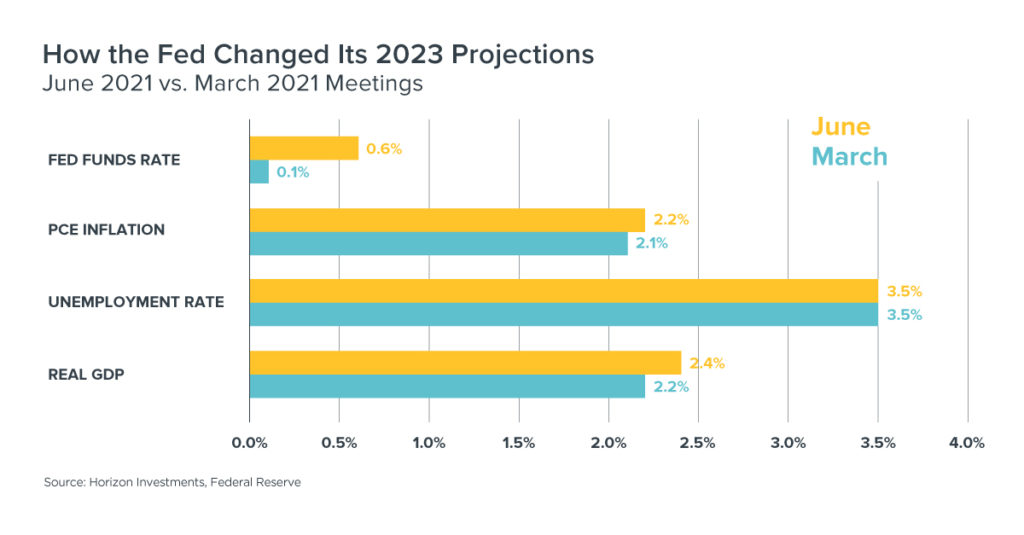The Federal Reserve’s first rate hike may be moved up by one year to 2023, according to the central bank’s economic projections
The Federal Reserve’s meeting last week sparked a selloff in stocks and bonds as the central bank’s projections showed it may bump up interest rates by the end of 2023, a year earlier than expected. Does it signal a return to more normal levels of interest rates? Not really, based on the Fed’s projections.
If the Fed’s main interest rate – the Fed Funds Rate – does rise by one-half of a percentage point two years from now, it will remain close to zero, according to the Fed’s June economic projections that were released last week.1 More importantly for financial advisors and their clients, that rate would be set well below inflation, which was bumped up by the Fed to 2.2% for 2023. The change in rates was the only large adjustment the central bank made to its projections (detailed in the chart below). All else being equal, interest rates set below the pace of inflation could be a tailwind for stocks. But retirees may find it difficult to generate interest income that beats inflation.
All else being equal, interest rates set below the pace of inflation could be a tailwind for stocks. But retirees may find it difficult to generate interest income that beats inflation.
With such a small change to the 2023 projections, why did stock and bond markets have such a big reaction?
Horizon Investments attributes that to investors who positioned their portfolios for an uneventful summer, when strong readings on inflation and economic growth would have no effect on the Fed’s interest rate path. Instead, they were jolted by the signal of a rate hike, which could not only slow the economy’s growth but also slow the long-term pace of inflation. In financial markets, that surprise took the form of falling economically-tied cyclical stocks and an unwinding of bond market positions based on a large difference in short- and long-term Treasury yields. A reaction that’s since been partially reversed.
The portfolio adjustments investors may make in light of an earlier-than-expected rate hike could cause a bumpy summer for markets. Yet, Horizon believes goals-based investment plans should still be positioned for economic growth. After all, the Federal Reserve is projecting it will set interest rates at an abnormally low level through 2023, despite above-trend economic conditions.
Retirees and those nearing retirement, however, still face a world of low interest rates for as far as the eye can see. Low rates may reduce the probability that returns on fixed-income investments will be sufficient to meet their inflation-adjusted spending during a long retirement.
For goals-based financial planning in a low interest rate world, Horizon continues to favor a tilt more towards both equities and alternatives than to traditional bonds for clients nearing or in retirement (see Horizon’s Q1 Focus report titled “Crushed by Zero”). Consider that at one point last week, the 30-year Treasury bond yielded 2.01% — a level that would barely keep pace with the long-term increase in the cost of living that’s projected by the Fed.
1 Federal Reserve Board economic projections, June 16, 2021
To download a copy of this commentary, click the button below.
Further reading:
Essentially Nothing. That’s How Much Bonds May Return Over Next Five Years
It’s Getting Harder to Fund Retirement Using Bonds
If Inflation Returns, Bond’s Diversification Power May Disappear
The Stock Market Is Strange, But Not Broken by GameStop: Market Notes
This commentary is written by Horizon Investments’ asset management team. For additional commentary and media interviews, please reach out to Chief Investment Officer Scott Ladner at 704-919-3602 or sladner@horizoninvestments.com.
To discuss how we can empower you please contact us at 866.371.2399 ext. 202 or info@horizoninvestments.com.
Nothing contained herein should be construed as an offer to sell or the solicitation of an offer to buy any security. This report does not attempt to examine all the facts and circumstances that may be relevant to any company, industry or security mentioned herein. We are not soliciting any action based on this document. It is for the general information of clients of Horizon Investments, LLC (“Horizon”). This document does not constitute a personal recommendation or take into account the particular investment objectives, financial situations, or needs of individual clients. Before acting on any analysis, advice or recommendation in this document, clients should consider whether the security in question is suitable for their particular circumstances and, if necessary, seek professional advice. Investors may realize losses on any investments. Index information is intended to be indicative of broad market conditions. The performance of an unmanaged index is not indicative of the performance of any particular investment. It is not possible to invest directly in an index.
Past performance is not a guide to future performance. Future returns are not guaranteed, and a loss of original capital may occur. This commentary is based on public information that we consider reliable, but we do not represent that it is accurate or complete, and it should not be relied on as such. Opinions expressed herein are our opinions as of the date of this document. These opinions may not be reflected in all of our strategies. We do not intend to and will not endeavor to update the information discussed in this document. No part of this document may be (i) copied, photocopied, or duplicated in any form by any means or (ii) redistributed without Horizon’s prior written consent.
Other disclosure information is available at www.horizoninvestments.com.
Horizon Investments and the Horizon H are registered trademarks of Horizon Investments, LLC
©2021 Horizon Investments LLC

